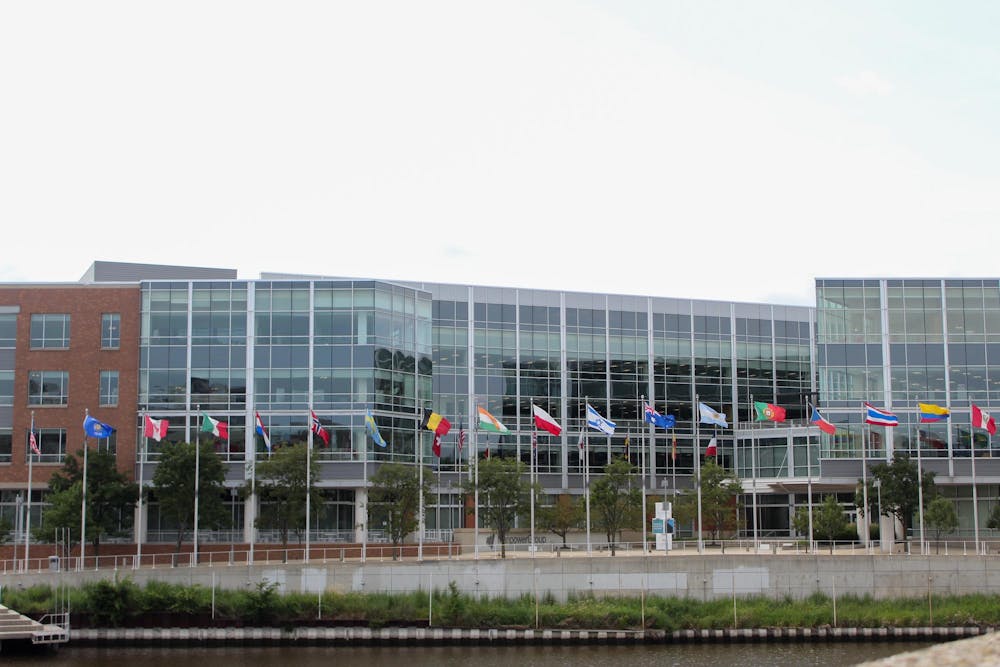This story is part of the IDS’ national convention coverage. Follow reporter Andrew Miller on X and IDS social media for updates.
MILWAUKEE — Brian Tigges was living in a small town in Iowa when he said outsourcing took away that town’s lifeblood — button manufacturing.
That was in the 1990s to early 2000s, an era where trade agreements spread widely, increasing GDP and making goods cheaper. But there were also some setbacks.
The North American Free Trade Agreement of 1994, which former president Donald Trump eventually replaced, cut trade barriers between the U.S., Canada and Mexico. But it also led to job loss across manufacturing sectors in America.
The struggles in Tigge’s town of Muscatine, Iowa, also came as the Chinese economy rapidly industrialized — and as the country joined the World Trade Organization in 2001.
Some politicians — including former President Donald Trump — say letting outsourcing take root put American workers at a disadvantage, forcing them to compete with cheaper labor. The issue was likely a key factor in Trump’s pick of J.D. Vance for his vice presidential candidate, who has long advocated for protectionist policies in trade.
Once cheaper Chinese-manufactured buttons started appearing in America, Tigges said, the town felt the pressure.
“There were no more jobs for people working with buttons, and that was the number one employer,” he said.
Tigges said he isn’t a Republican, but somewhere in the middle. He decides his stance individually on each issue, he said.
But as he sat outside the entrance to the Republican National Convention on Monday, he said he agreed with Trump’s “a little bit isolationist” policies toward trade. Other RNC attendees echoed his sentiments, some saying it would be the best way to reduce reliance on Chinese exports.
This leads to one of the most crucial economic aspects of Trump’s presidency and the Republican party’s platform in 2024 — an increase in tariffs. Trump, this campaign season, proposed a 10% levy on all imports and a 60% tariff on all Chinese goods.
The party’s 2024 platform doesn’t outright list 10%, but says “Republicans will support baseline Tariffs on Foreign-made goods.”
Potential retaliation was previewed in Trump’s presidency, as a trade war with China, which the Brookings Institute said significantly hurt the American economy.
Other economists have called proposals to increase tariffs “just a form of a tax,” saying it would increase prices across the board and drive up inflation.
On tariffs Trump imposed during his presidency on solar panels, aluminum, steel and Chinese goods, Americans have paid more than $240 billion as of late last month, according to U.S. Customs and Border Protection.
Biden has kept those tariffs in place and levied new ones during his presidency.
RNC attendees, including Anne Hansen, a soon-to-be retiree from Minnesota, said Trump’s proposal would help America, regardless of its economic impact.
“The United States is absolutely dependent on China for important things that they might withhold at some point,” Hansen said. “And then what do we do?”
But Mostafa Beshkar, an IU professor of economics who focuses on international trade, said the policy could be disastrous for the U.S. and Indiana. And for a potential future Trump administration, he said, the levies would be easy to implement.
While Beshkar agrees that combating China is in America’s interests, he feels the proposed tariffs are the wrong way to go about it. Instead, he said, the U.S. should cooperate with the manufacturing giant and use trade agreements as a way to curtail the country’s influence.
That’s because it could lead to intense backlash from other countries the U.S. trades with, who may start implementing their own duties and tariffs on American products. That could result in price increases across the board, Beshkar said, in addition to geopolitical tensions.
“There will be immediate backlash,” he said.
The imposed tariffs, Beshkar said, would impact a growing exporter — Indiana. Federal export data aggregated by research organization WISERTrade shows an almost $9 billion rise in Indiana’s exports between 2022 and 2023 — for a total of more than $54 billion last year.
The database also indicates an exceptional year in 2024 so far. From Jan. 1, 2023, to May 2023, Indiana had more than $21 billion in exports. From the start of this year to May, Indiana exported almost $26 billion.
Beshkar said that means the policy could hurt Indiana, because of its large presence in agriculture and manufacturing.
An increase like the one proposed, he said, could even hurt the manufacturing sectors the policy promises to bolster. That’s because, he said, it would make components of manufactured goods that come from foreign countries more expensive.
Trump’s pick of J.D. Vance, however, indicates a continued shift toward pro-tariff policies in the Republican party. Supporters outside the RNC on Monday lauded Vance’s stance on the issue, saying it would put “America first.”
— Andrew Miller covers politics and elections for the Indiana Daily Student. Contact him at ami3@iu.edu, or direct message via X.




